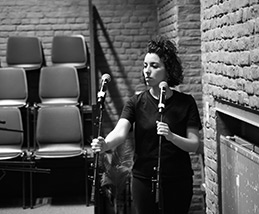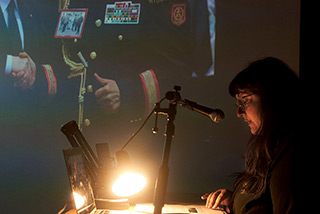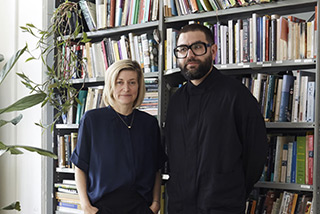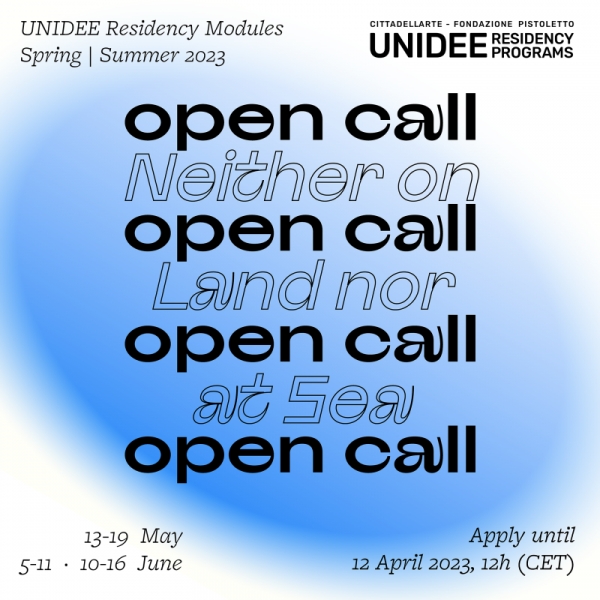UNIDEE Residency Modules: NEITHER ON LAND NOR AT SEA - Spring & Summer 2023 | open call & selected residents
UNIDEE Residency Programs and Cittadellarte - Fondazione Pistoletto are pleased to announce an open call for participation in the first two seasons of residency modules in the programme Neither on Land not at Sea. Meeting by the Mediterranean Im/Possible, curated by UNIDEE Visiting Curator Chiara Cartuccia.
Neither on Land nor at Sea invites to meander around unreducible complications and on shifting grounds, to explore together ways in which geography is historically, socially, and politically produced. The project pluralises Mediterranean concepts/spaces as sites of worldmaking and experimentation in communal living. To do so, it adopts un-grounded geographies and colliding historicities as meeting places, in which to congregate to elaborate on the role played by situated practices and shared processes in the promotion of social transformations, towards epistemic justice.
The UNIDEE modules are programme-based week-long residency formats. Participating residents will be offered the opportunity to expand on their ongoing research and practice exploring Mediterranean complexities and geographical thinking in the arts and beyond, within a group of peers and invited guests. The Spring & Summer modules are curated by UNIDEE Visiting Curator with invited mentors: interdisciplinary artist and filmmaker Noor Abed, critical spatial practitioners FRAUD (Audrey Samson & Francisco Gallardo), and artist, researcher and educator Alessandra Ferrini.
For more information about the context and scopes of the project, please read the full curatorial framework here.
The first leg of the Neither on Land nor at Sea residency modules is articulated in two seasons, a Spring Season, taking place in May, and a Summer Season, taking place in June.
The exact dates of the modules are as follows:
Spring Season
• Module I: 13-19 May
Summer Season
• Module II: 5-11 June
• Module III: 10-16 June
Invited mentors in each module are: Noor Abed (Spring Season, Module I), FRAUD (Summer Season, Module II) and Alessandra Ferrini (Summer Season, Module III).
More guests in each module will be announced soon.
The programme of each module will employ different working formats that foster collaboration and exchange, including workshops, reading sessions, talks, screenings, collective interventions and exercise (indoors and outdoors), one-on-one mentoring, according to the specific approach proposed by each mentor and to the needs of the group.
Neither on Land nor at Sea is curatorially conceived as an organic project, which articulates across the single residency modules and an accompanying public programme over the duration of a biennium. The modules are interlinked, and each contributes to shaping the discourse developed by the project as a whole. Residents will be asked to leave a ‘trace’ of their participation behind. This can take different forms –from a commented bibliographic reference to a visual fragment, in video, photo, drawing etc., a sound recording, a written note, or a shared toolkit. The material thus collected will be made accessible to future and past residents, both in the physical spaces of UNIDEE and online, through the Neither of Land nor at Sea digital platform.
The residency programme’s working language is English
We aim to invite a group of up to 8 residents to take part in each module. The programme is open to international participants of all backgrounds, whose practice sits anywhere across the broad spectrum of visual practice and research, with no restriction regarding disciplines, media or methodologies of work. Applications from artists, curators, writers, theorists, activists, all are welcome and encouraged.
The selection of participants will be based on the affinity of the subject matters, concerns and questions participating in the applicant’s work with those expressed by the curatorial framework of the project, as well as on the applicant interest and ability to contribute to a programme-based residency whose working is grounded in processes of active exchange and participation.
The residency modules will take place at Cittadellarte - Fondazione Pistoletto, in Biella, Italy. The UNIDEE and Cittadellarte spaces will host a large part of the programme, while further opportunities for exploring the urban and rural landscape of Biella and its immediate surroundings will be offered.
Participants will be accommodated within the premises of Cittadellarte, in single rooms with the use of shared bathrooms. The residential spaces offer basic cooking facilities and communal resting areas.
Participants arrival is expected by the afternoon of the day prior to the beginning of the module, departure is expected by the afternoon of the day following the end of the module.
We are committed to meeting to the best of our ability any accessibility requirements an attendee may have; this will be discussed individually with prospective residents.
Participation in the Spring & Summer modules is offered free of charge, and the residents will be provided with free accommodation at Cittadellarte.
Residents will be required to arrange and cover expenses for their travel to/from Biella and for the food/living costs whilst in Cittadellarte.
A limited number of partial and full bursaries – including a contribution towards travel costs – are made available to those who would not otherwise be able to participate; please remember to state in your application whether you would like to be considered for this.
To apply you need to submit the following documents:
• the filled out application form
• a single document containing a 1) detailed CV (2-page limit) and 2) a portfolio including up to three recent projects (in PDF format, max 6MB)
Each applicant is requested to express a first and a second choice as for the module they would like to participate in.
The application material must be submitted via email at unidee@cittadellarte.it, with the subject line “UNIDEE Modules Spring/Summer 2023 Application (your name)”.
Deadline for submissions is 12 April 2023, 12pm (CET)
All applicants will be informed about the result of their application by 18 April 2023.

Noor Abed (b. 1988, Palestine) works at the intersection of performance, media and film. Her works create situations where social possibilities are both rehearsed and performed. Abed’s work has been screened and exhibited internationally at Anthology Film Archives, New York, Gabes Cinema Fen Film Festival, Tunisia, Jihlava International Documentary Film Festival, The New Wight Biennial, Los Angeles, Leonard & Bina Gallery, Montréal, Ikon Gallery, Birmingham, Ujazdowski Centre for Contemporary Art, Warsaw, The Mosaic Rooms, London, and MAXXI - National Museum of 21st Century Art, Rome, among others. In 2020, she co-founded, with Lara Khaldi, the School of Intrusions, an independent educational collective in Ramallah, Palestine. Abed is currently a resident at the Rijksakademie in Amsterdam 2022-24 and was recently awarded the Han Nefkens Foundation/Fundació Antoni Tàpies Video Art Production Grant 2022.
www.instagram.com/noor_abed/
Conceptual note, or a first trigger
Then I wondered: how does the place become
a reflection of its image in myth,
or an adjective of speech?
And is a thing's image stronger
than the thing itself?
If it weren't for my imagination
my other self would have told me:
you are not here!
Mahmoud Darwish
excerpt from: NOT AS A FOREIGN TOURIST DOES
Methodologies
Introduction session, collective interventions and exercises (indoors and outdoors), thinking together/with sites.

Alessandra Ferrini is a London-based artist, researcher and educator. Experimenting with the expansion and hybridization of the documentary film, her research questions the legacies of Italian colonialism and Fascism, with a specific interest in the past and present relations between Italy and the Mediterranean region. Her work has featured in international exhibitions, including: 5th Casablanca Biennale (2022-23), ar/ge kunst (Bozen, 2022, solo show), Maxxi Museum of XXI Century Art (Rome, 2022), MOMus-Museum of Contemporary Art Thessaloniki (2021), Manifesta 13 Paralléles du Sud (Marseille, 2020), Museion Bozen (2020), Sharjah Film Platform (2019), Istanbul Biennal collaterale (Depo 2019), 2nd Lagos Biennal (2019), Manifesta 12 Film Programme (Palermo, 2018), Villa Romana (Florence, 2018 and solo show 2019), Fondazione Sandretto Re Rebaudengo (Turin, 2018, 2020, 2021 and 2022). Her long-term research-based project Gaddafi in Rome was the winner of the Maxxi Bvlgari Prize 2022 and was the recipient of the 2017 Experimenta Pitch Award at the London Film Festival (British Film Institute). She is a PhD candidate at the University of the Arts London and a Research Fellow at the British School at Rome. Her writing has been published internationally and featured in Everything Passes Except the Past - Decolonizing Ethnographic Museums, Film Archives and Public Space edited by Jana Haeckel for Sternberg Press (2021).
www.alessandraferrini.info
www.instagram.com/alessandra.ferrini
Conceptual note, or a first trigger
Through a situated investigative methodology rooted in critical whiteness studies, I am interested in exploring the specific imaginary that constitute the Euro-Mediterranean as a hegemonic space, shaped by colonial continuities, neo-imperialist interests, and necropolitical dynamics. As a collective but highly personal exploration of notions of positionality, resistance, and accountability, I wish to scrutinise the uses and abuses of history within nationalist ideologies and international relations across the Euro-Mediterranean, with a focus on media events, political performance and technologies of war, vision, and communication.
Methodologies
Mixed format: screenings, readings, collaborative activities and 1-1 sessions.
Aim: to collectively develop a creative investigative toolkit.

FRAUD (Audrey Samson & Francisco Gallardo) is a London-based duo whose spatial practice is concerned with modes of thinking materially about decolonization as a geosocial process, thinking with the ways in which we might encourage relations of solidarity which promote the inseparability of land, water and body. Audrey is a Senior Lecturer in the Art Department at Goldsmiths. Somerset House Studios alumni, the duo has been awarded the State of Lower Saxony – HBK Braunschweig Fellowship (2020), the King’s College Cultural Institute Grant (2018), and has been commissioned by Contemporary Art Archipelago (2022), the Istanbul Design Biennial (2020), RADAR Loughborough (2020), and the Cockayne Foundation (2018). Francisco is an architect who was awarded the Wellcome Trust People Awards (2016) and authored ‘Talking Dirty’ published by Arts Catalyst (2016). He is a studio tutor in architecture at Loughborough University. The duo’s work is part of the permanent collections of the European Investment Bank Institute (LU) and the Art and Nature Center - Beulas Foundation (SP).
euro-vision.net
www.instagram.com/la_fraud
Conceptual note, or a first trigger
Addressing the historiographical invisibility (Aixelà Cabré, 2020) alluded to in Ahmed Morsi's poetry, where certain disappearances, whilst remembered, are not inscribed in History, how can we account for the plurality of Mediterraneans, even those effaced? Through our art-led enquiry, EURO-VISION, we have been thinking with and through the EU's Critical Raw Materials Initiative, tracing its operations as political technology of racial capitalism and governance of resources.
Developmental historians have pointed that this initiative can be traced back to the 1983 G7 summit in Williamsburg, Virginia, USA. This event is perhaps better known for its arms control agreements with the Soviet Union, as well as constituting the first participation of the EU commission in the inter-governmental forum. The Williamsburg Declaration is perhaps lesser known for its foundational role in creating the free trade environment that currently sustains commodity markets, and with it, raw material trading.
However, this is only a part of a story that arguably began with the Berlin Conference (1884-85), often referred to as the partition of Africa, or with earlier 19th century imaginaries such as the French trope depicting North-Africa as ‘The Granary of Rome’, providing the republic the discursive foundations for its protectorates in Algeria, Tunisia and Morocco. France, self-appointed successor of the Roman Empire, tasked itself with the transformation of the Sahara desert into a modern Garden of Hesperides. Other extractive imaginaries include German architect Herman Sörgel’s Atlantropa, a mega dam infrastructure, effectively a sea-land grab across the Med, designed to facilitate access to resources in the southern continent as well as hydroelectricity.
These powerful fantasies often circumscribed the Med as a syphon, institutionalising the colony’s role as purveyor of raw materials.
Later, based on the notion of Eurafrica, the European Economic Community (predecessor of the European Union), was explicitly predicated upon the exploitation of African resources, which could be better accomplished through the community’s coordinated effort (Hansen & Jonson, 2013, Samson and Gallardo, 2021). Another trope was the California-Morocco analogy in order to usher in large scale citrus cultivation. Nowadays, Morocco houses a dynamic and evolving digital ecosystem, servicing the outsourcing of EU Border surveillance.
Methodologies
By examining these genealogies together, through archival materials and selected readings, we aim to make-sense of the extractive visions by co-developing terminology through a collective glossary, and begin to imagine otherwise by reclaiming some of these terms, and by creating vocabularies which might subtend a Mediterranean plurality.
UNIDEE Residency Programs is made possible thanks to the support of Regione Piemonte, Fondazione Compagnia di San Paolo, CRT Fondazione Cassa di Risparmio di Torino, illycaffè S.p.A., Fondazione Zegna, project "Alexandria:(re)Activating common urban imaginaries" of European Union’s Creative Europe programme, A.M. Qattan Foundation, Inlaks Shivdasani Foundation, Institut Français Italy, Kimonos Art Center.
